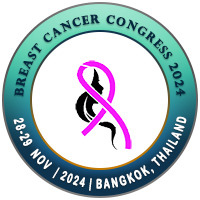3.jpg)
Levshin V.F.
N.N. Blokhin National medical research center of oncology, RussiaTitle: Knowledge about risk factors and prevention of breast cancer among Moscow women and impact of cancer education intervention on cancer knowledge and attitudes to cancer prevention
Abstract
Introduction. Breast cancer (BC) is the most common form of cancer among the female population in most countries of the world, including Russia. According to the international oncological database GLOBOCAN, breast cancer accounts for 25.1% of the total incidence of women with all types of cancer. In the structure of oncological morbidity of women in Russia, breast cancer accounts for 21% of the total incidence of malignant tumors. Although mortality from BC in many countries is declining, the incidence continues to increase. At the same time, the many causes and risk factors of breast cancer are known and definite measures of evidence-based prevention of breast cancer have been developed. However, the possibilities of cancer prevention are clearly not used enough due to the lack of involvement of the population in the observance of preventive measures.
Objective. The purpose of the study is to assess the level of knowledge of the women population regarding the possibilities and measures of BC prevention and to evaluate the effectiveness of the certain form of cancer education among the population.
Material and methods. A cross-sectional study was conducted at Moscow and primary data was collected from 284 women aged 18-76. Structured questionnaire was used to collect quantitative data pertaining on breast cancer risk factors and prevention awareness. In addition, 73 women who showed no or minimal knowledge of cancer prevention were interviewed after reading the information brochure "How not to get cancer." The brochure, in a language accessible to a wide range of readers, provides scientific and reliable information on the main causes and risk factors for the development of cancer and proven effective measures for cancer prevention. The survey in the form of a telephone interview was conducted according to a structured questionnaire that included 10 questions regarding the clarity and personal informativeness of brochure, its usefulness and the possibility of applying the information and recommendations for yourself. Statistical processing of data was carried out by methods of descriptive statistics and one-factor analysis of variance.
Results. 33.2% (95% CI 28.8% -37.6%) of respondents in the study sample did not know or had misconceptions about the purposes of preventive and screening examinations, provided in the health service. The majority, 65.5% (95%CI 61.07%-69.9%), had limited knowledge, and only 1.3% (95%CI 0.25%-2.35%) of respondents having relatively sufficient knowledge. 40.6% (95% CI 36.03%-45.07%) of the respondents knew nothing about the scientifically proven measures and methods for cancer prevention and only 19.1% (95% CI 15.44% - 22.76%) had relatively sufficient knowledge. Less than half of the respondents, 43.8% (95% CI 39.18% -48.42%). had sufficient motivation to undergo preventive examinations. Among women who were interviewed after reading the brochure "How not to get cancer", 77% (95% CI 68%- 86%) of respondents rated the brochure information as "very or quite interesting". And none of those surveyed rated the brochure as "not interesting." 92% (95% CI 86%-98%) of respondents answered that they
understood everything in the content and text of the brochure and 71% (95% CI 61% to 81%) expressed a desire to take some preventive measure to eliminate or limit the action of 1 or more known cancer risk factors from their lifestyle and environment.
Conclusion. Only active use of evidence-based and effective prevention methods in the health system can stop the growth and achieve a significant BC incidence reduction. A key condition for the successful and effective implementation of primary prevention methods is to increase awareness among women regarding the causes and features of BC development and this cancer prevention measures. The results of the study confirm the effectiveness of the information brochure "How not to get cancer" for the dissemination of scientifically based knowledge about cancer diseases and BC particularly.
Biography
To be updated soon.

